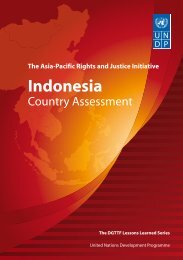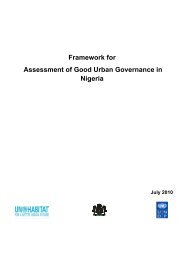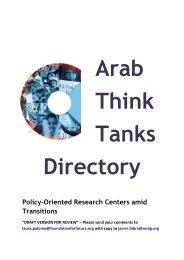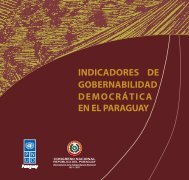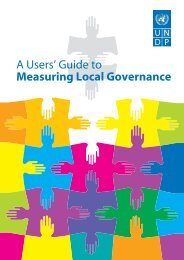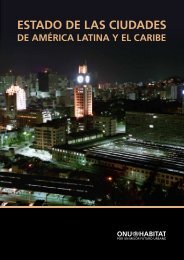planning a governance assessment - United Nations Development ...
planning a governance assessment - United Nations Development ...
planning a governance assessment - United Nations Development ...
You also want an ePaper? Increase the reach of your titles
YUMPU automatically turns print PDFs into web optimized ePapers that Google loves.
The first project period from June 2004 to March 2006, was a follow-up project to the Fifth International Conference of New<br />
and Restored Democracies (ICRND), carried a total price tag of US$530,300 and had multiple donors, of which USAID was the<br />
most important. The budget was divided into eight outputs:<br />
• $135,621 was allocated to build consensus on the avenues of strengthening the ICNRD follow-up mechanisms and<br />
processes, and on implementation and monitoring strategies for the Ulaanbaatar Declaration and Plan of Action, as well<br />
as international sharing of Mongolia’s experience in democratic <strong>governance</strong> building and its national ICNRD5 follow-up<br />
action plan. Costs here were mostly related to communication, communication material and international travel.<br />
• $32,000 was allocated to on-going democratic <strong>governance</strong> programme. Reviews and consultations were held to<br />
identify the gaps and missing links to develop a Mongolia national action plan. Costs here were mostly related to<br />
research and studies.<br />
• $56,800 was allocated to design and implement a pilot project on democratic <strong>governance</strong> indicators, with technical<br />
advice from UNDP, its Bureau of <strong>Development</strong> Policy (BDP), and its Oslo Governance Centre (OGC). Here most of the costs<br />
were related to subcontracting national research institutions and secondly on audio-visual productions used in<br />
consultations.<br />
• $70,767 were allocated to design and implement a broadly consultative and participatory activity for the preparation of<br />
the Country Information Note, which was based on the guidelines developed with UNDP/BDP support and drawing<br />
from work on democratic <strong>governance</strong> indicators. Most costs here were allocated to transportation and daily allowances<br />
of participants, but also $10,000 was spent on studies and research.<br />
• $6,050 was allocated to website maintenance.<br />
• $155,660 was allocated to develop the capacity of government, including parliamentary strengthening.<br />
Most costs were allocated to international consultants, but they also covered salaries of several local staff and office<br />
operational costs such as stationery.<br />
• $28,679 was allocated to dissemination of the results.<br />
• Finally, $15,009 was allocated to providing professional services such as auditing.<br />
The second phase of the project (2007-2008) aimed to strengthen democratic processes through participatory democracy<br />
<strong>assessment</strong> and MDG9, using a set of institutionalized democratic <strong>governance</strong> indicators designed to improve policy and<br />
practice. Similar to the first phase, democratic <strong>governance</strong> indicators formed a means, rather than an end, which accounts<br />
for some of the greater costs compared with <strong>assessment</strong>s that are more stand-alone and less embedded in a long-term<br />
political process. The implementing agency was the Institute of Philosophy, Sociology and Law at the Mongolian Academy<br />
of Science, a local research institute.<br />
This second phase was funded by the <strong>United</strong> <strong>Nations</strong> Democracy Fund (UNDEF) and carried a total price tag of US$238,350.<br />
The budget was divided into 4 outputs:<br />
• $120,000 was allocated to streamline democratic <strong>governance</strong> indicators and develop a set of specific target indicators<br />
to assess democracy and MDG9 and obtain approval by the Government. Of this sum $44,000 was allocated to research<br />
produced by national consultants, $18,500 to an international consultant, $12,000 to consultations and $17,000 to<br />
training of local researchers and participation in international conferences.<br />
Planning a Governance Assessment: A Guide to Approaches, Costs and Benefits<br />
37


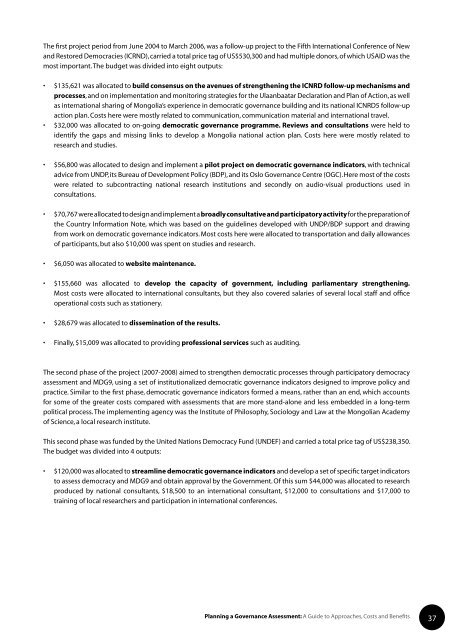
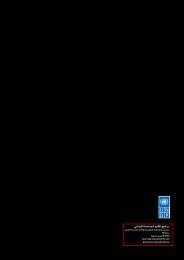
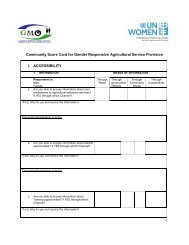
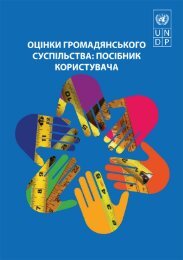
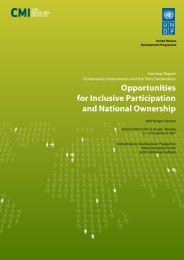
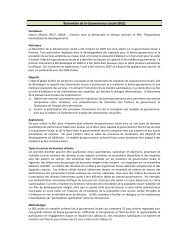
![GuÃa del Usuario ] - Governance Assessment Portal](https://img.yumpu.com/44740603/1/190x253/gua-a-del-usuario-governance-assessment-portal.jpg?quality=85)
